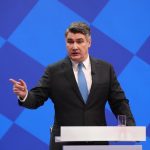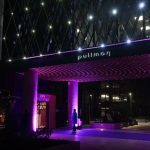According to election results released at 5h CET (with 99.98% votes processed) on December 23, 2019; Croatia President Kolinda Grabar-Kitarović and former Prime Minister Zoran Milanović will advance to round two of the Croatian presidential elections on January 5, 2020. Miroslav Škoro, a popular folk musician, who was closely trailing Grabar-Kitarović in the early exit polls, will not advance to the second round.
Here is a breakdown of the final results for all eleven presidential candidates:
29.55% – Zoran Milanović – Former Prime Minister | SDP
26.65% – Kolinda Grabar-Kitarović – Current President | HDZ
24.45% – Miroslav Škoro – Folk singer and former Croatian Parliament Representative | Independent
5.87% – Mislav Kolakušić – Former Judge and EU Parliament Representative | Independent
4.61% – Dario Juričan – Legal name: Milan Bandić. Filmmaker and Performance Artist | Independent
2.89% – Dalija Orešković – Former Chair Conflicts of Interest Croatian Parliament | Independent
2.31% – Ivan Pernar – Member of Croatian Parliament | Party of Ivan Pernar
1.12% – Katarina Peović – Former member of Zagreb City Council | Workers’ Front
0.95% – Dejan Kovač – Economist and Princeton graduate | HSLS
0.21% – Anto Đapić – Former Osijek Mayor and Former Member of Croatian Parliament | DESNO
0.15% – Nedjeljko Babić – Regional party candidate | HSSČKŠ
First Woman President of Croatia
Kolinda Grabar-Kitarović, born April 29, 1968; is the fourth and current President of Croatia since 2015. She is the first woman to be elected to the office since the first multi-party elections in 1990. At 46, she also became the youngest person to assume the presidency.
Before her election as president, Grabar-Kitarović held several governmental and diplomatic positions. She was Minister of European Affairs from 2003 to 2005, the first female Minister of Foreign Affairs and European Integration from 2005 to 2008, Croatian ambassador to the United States from 2008 to 2011 and the NATO Assistant Secretary General for Public Diplomacy from 2011 to 2014.
Grabar-Kitarović was the only female candidate in the Croatian presidential elections held in December 2014 and January 2015 and was runner-up in the first round. She proceeded to narrowly defeat incumbent President Ivo Josipović in the second round. Her strong performance in the first round was unexpected, as most opinion polls had given President Josipović a strong lead. In the second round, Grabar-Kitarović defeated Josipović by 1.48%, which was the closest percentage margin of any presidential election to date.
She was a member of the conservative of HDZ (Croatian Democratic Union) from 1993 to 2015 and was also one of three Croatian members of the Trilateral Commission, but was required to resign both positions upon taking office as president in 2015, as Croatian presidents are not permitted to hold other political positions or party membership while in office. In 2017, Forbes magazine listed Grabar-Kitarović as the world’s 39th most powerful woman.
Grabar-Kitarović’s 2019 presidential campaign has been marked by a series of gaffes and apparent missteps. She enjoys a warm political association with controversial Zagreb Mayor Milan Bandić, whose party officially endorsed her candidacy. Last week, she claimed during a campaign rally in Osijek that she had secured jobs for Croatian citizens to work from home for 8000 EUR, after they had received training abroad.
After refusing to debate other presidential candidates before the first election round; she relented and agreed to one debate with all eleven candidates on HRT (Croatian Radio Television), a public network frequently accused of favoring the president’s former political party (HDZ). Even though only three of the eleven presidential candidates were consistently polling in the double digits, Grabar-Kitarović refused offers by commercial networks to debate her top two contenders. She justified her decision by indicating that she believed all the presidential candidates should be heard. The resulting debate, which took place just days before the election, was a two-and-a-half-hour fiasco, in which all eleven candidates were given opportunities to discuss their views on abortion, religious education, corruption, border control and gay pride.
Former Prime Minister of Croatia
Zoran Milanović, born October 30, 1966; is the former Prime Minister of Croatia, a position which he held from December 2011 to January 2016. He was the leader of SDP (Social Democratic Party of Croatia), the largest centre-left political party in Croatia, from 2007 to 2016. He served as Leader of the opposition twice, from 2007 to 2011 and from January to November 2016, when Davor Bernardić succeeded him as SDP leader.
After graduating from the Zagreb Faculty of Law, Milanović began his career the Croatian Ministry of Foreign Affairs. He served as an advisor at the Croatian Mission to the European Union and NATO in Brussels from 1996–99. In 1998 he earned his master’s degree in European Union law at the Flemish University in Brussels and was an assistant to the Foreign Minister of Croatia for political multilateral affairs in 2003.
In June 2007 he was elected President of SDP, following the death of Prime Minister Ivica Račan. In 2011, Milanović initiated the formation of the Kukuriku coalition, uniting four center-left political parties. The coalition won an absolute majority in the 2011 parliamentary election, and SDP became the strongest party in parliament. Milanović became Prime Minister on December 23, 2011, after the parliament approved his cabinet.
Milanović’s term as Prime Minister was marked by Croatia’s entry into the European Union. His cabinet introduced changes to the tax code, passed a fiscalization law, and began several large infrastructure projects. Milanović also supported the expansion of same-sex couples rights and introduced the Life Partnership Act.
Following the 2015 election, he was succeeded as Prime Minister by Tihomir Orešković. Milanović led the four-party coalition until the early parliamentary elections in September 2016. Following a surprise defeat, Milanović announced his withdrawal from politics. He then entered the consulting business and worked as an advisor to Albanian Prime Minister Edi Rama.
On June 17, 2019; Milanović announced that he would be running for President of Croatia as the SDP’s candidate in the upcoming election. Under the slogan “A President with Character,” he ran his campaign based on center-left principles and values, and his record as prime minister. He acknowledged making mistakes as Prime Minister and does not want to increase the powers of the Croatian presidency, which have been reduced since President Franjo Tuđman’s term ended in 1999. Milanović also insisted that he would not participate in a presidential debate without Kolinda Grabar-Kitarović’s guaranteed participation, which was verified a day before the presidential debate was broadcast on HRT.
Popular Musician Fails to Advance
Miroslav Škoro, born July 29, 1962; is a Croatian pop-folk musician and politician. His music is characterized by its traditional tamburitza sound, updated to appeal to a contemporary audience.
Born in Osijek, Škoro completed his degree in Civil Engineering at the University of Osijek. He subsequently spent some time in the United States of America where he attended the Community College of Allegheny County for two years.
He emerged on the Croatian music scene with his debut album “Ne dirajte mi ravnicu” (Don’t touch my prairie) and produced a song of the same name, which would go on to be one of the most famous Croatian songs. In 2002, Škoro collaborated with controversial right-wing singer Marko Perković on the song “Reci, brate moj” (Tell me, my brother). They continued their collaboration on the single “Sude mi” (They’re putting me on trial), which was dedicated to former Croatian general Ante Gotovina.
In addition to a music career, Škoro has enjoyed a career in politics. From 1995 to 1997, he was the Croatian general consul to Hungary. Between 2001 and 2006, Škoro was the Chairman of the Board of Croatia Records. In 2007, he joined HDZ (Croatian Democratic Union) and won a seat in the parliament the same year. Škoro took office in January 2008 but resigned ten months later due to his disappointment over the way he felt that politicians were being treated by the Croatian media.
On June 23, 2019; Škoro announced his candidacy in the 2019 Croatian presidential election. In a video message on his Facebook page, Škoro indicated that changes to the constitution are needed and that the president should have more powers. He maintained 3rd place in pre-election polls, close behind Grabar-Kitarović and Milanović. His campaign was supported by several right-wing parties including HKS, Hrast and Most.
Škoro’s presidential campaign has been marked by controversy. He was living in the United States during the Homeland War while many of his peers remained in Croatia defending her borders. He indicated that he would pardon convicted Croatian war criminal, Tomislav Merčep. During the presidential debate, he promised to send troops to secure the border to prevent illegal migrants from entering Croatia. Škoro also violated terms of the “election silence” at least three times since it went into effect 24 hours before election day and ended at 19h after the polls closed. During the election silence, candidates are forbidden from campaigning.
Follow our Politics page for updates on the 2019/2020 Croatian presidential elections.










